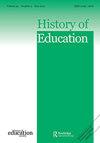New education and its emancipatory interests (1920-1950).
IF 0.4
4区 教育学
Q4 EDUCATION & EDUCATIONAL RESEARCH
引用次数: 23
Abstract
The New Education Fellowship (NEF) was a voluntary but in ̄ uential organization established in 1921 by Mrs Beatrice Ensor, whose theosophical connections were used to launch it on an international scale. It aimed to create and disseminate new pedagogic practices as the necessary foundation for future world unity and democracy. The NEF de® ned `New Education’ as a critique of the prevailing system of education epitomized by the Public Schools and as a positive philosophy of a childcentred pedagogy. The NEF was unique in a number of ways, which enhanced its scope and in ̄ uence, constituting a new discursive formation in education. First, it created an international intellectual ® eld over the next 30 years. Second, it brought together a range of related professions, namely, teachers, teacher-trainers , academic experts, educational administrators , psychologists and psychiatrists. Third, it had connections with the state at local level through the membership and at national level via representation on government committees, although its in ̄ uence varied between countries. Fourth, it achieved international recognition, initially representing the educational wing of the League of Nations and later for its role in launching UNESCO. Fifth, it included parents in the belief that New Education should embrace all aspects of the child’ s life. This article traces the emancipatory interests of New Education from 1920 to 1950. The concept of `emancipatory interests’ derives from Habermas, who speci® ed the connections between knowledge and human interests. His notion of critical theory underpins emancipatory interests, incorporating the dialectic of critique and self-re ̄ ection as a guide to the positive transformation of conditions of distorted individual or institutional communication. Habermas’s concept of emancipatory interests re ̄ ects the similarity of objectives for critical theory and New Education. New Education implied a critique of the existing system of education, recognizing its limitations but also using this knowledge as a basis for the realization of the educational interests of children in the reconstruction of society. There is also similarity in the reliance on psychoanalysis in Habermas’s work and in the science of New Education. Ewert, in his review of the application of Habermas’s theories in education, stresses that critical theory is useful in its emphasis on emancipation and action in the unity of theory and practice. He argues that `critical education science focuses on the constant transformation of educational practice to achieve the two goals of enlightenment and emancipation’ . Thus, the validity of the theory depends upon its ability to describe, criticize and transform social practices.新教育及其解放性利益(1920-1950)。
本文章由计算机程序翻译,如有差异,请以英文原文为准。
求助全文
约1分钟内获得全文
求助全文
来源期刊

History of Education
Multiple-
CiteScore
0.80
自引率
0.00%
发文量
70
期刊介绍:
History of Education has established itself as a leading, international, peer-reviewed journal, focusing on the history of education in all parts of the world. The journal is recognised as a key resource for both educationists and social historians alike. The journal publishes original research and major reviews of books in the history of education. Papers dealing with both formal and informal education systems, comparative education, policy-making, the politics and experience of education and pedagogy are welcomed.
 求助内容:
求助内容: 应助结果提醒方式:
应助结果提醒方式:


